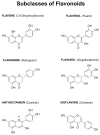The Potential of Flavonoids for the Treatment of Neurodegenerative Diseases
- PMID: 31234550
- PMCID: PMC6627573
- DOI: 10.3390/ijms20123056
The Potential of Flavonoids for the Treatment of Neurodegenerative Diseases
Abstract
Neurodegenerative diseases, including Alzheimer's disease (AD), Parkinson's disease (PD), Huntington's disease (HD), and amyotrophic lateral sclerosis (ALS), currently affect more than 6 million people in the United States. Unfortunately, there are no treatments that slow or prevent disease development and progression. Regardless of the underlying cause of the disorder, age is the strongest risk factor for developing these maladies, suggesting that changes that occur in the aging brain put it at increased risk for neurodegenerative disease development. Moreover, since there are a number of different changes that occur in the aging brain, it is unlikely that targeting a single change is going to be effective for disease treatment. Thus, compounds that have multiple biological activities that can impact the various age-associated changes in the brain that contribute to neurodegenerative disease development and progression are needed. The plant-derived flavonoids have a wide range of activities that could make them particularly effective for blocking the age-associated toxicity pathways associated with neurodegenerative diseases. In this review, the evidence for beneficial effects of multiple flavonoids in models of AD, PD, HD, and ALS is presented and common mechanisms of action are identified. Overall, the preclinical data strongly support further investigation of specific flavonoids for the treatment of neurodegenerative diseases.
Keywords: cell death; cognitive dysfunction; inflammation; neurodegenerative disease; oxidative stress; protein aggregation; synapse loss.
Conflict of interest statement
The author declares no conflict of interest. The funders had no role in the design of the study; in the collection, analyses, or interpretation of data; in the writing of the manuscript, or in the decision to publish the results.
Figures


References
-
- [(accessed on 21 June 2019)]; Available online: https://www.alz.org/alzheimers-dementia/facts-figures.
-
- [(accessed on 21 June 2019)]; Available online: https://parkinson.org/Understanding-Parkinsons/Statistics.
-
- [(accessed on 21 June 2019)]; Available online: https://rarediseases.org/rare-diseases/huntingtons-disease.
Publication types
MeSH terms
Substances
Grants and funding
LinkOut - more resources
Full Text Sources
Medical
Miscellaneous

